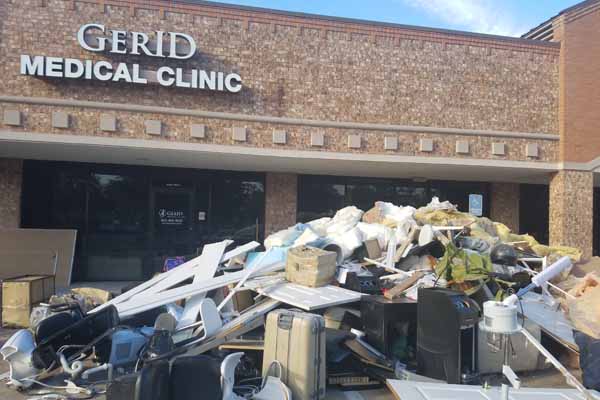
When evacuees flood into shelters on short notice, physicians often have to treat sick people with no access to the patients’ medical history or medication lists.
In addition, physicians’ practices may sustain damage, as many did during Hurricane Harvey, forcing their patients to seek care temporarily elsewhere.
September is National Preparedness Month. Do you have a disaster plan for your medical records?
If not, download and get familiar with DocbookMD, a free Texas Medical Association member benefit. With this HIPAA-compliant messaging app, you can send texts, PDFs, and images to TMA members in your area, all of whom are included automatically in the DocbookMD registry. During Harvey, some physicians used the app to send patient records to their colleagues.
Another essential part of any plan is to store patient records in a safe, secure location away from your main office so you can retrieve them quickly in an emergency.
If your electronic health records (EHRs) are stored on site, be sure to:
- Know how to reach your IT support company in an emergency;
- Understand the IT support company’s terms for recovering your system;
- Back up your data daily, and your entire system weekly. Test your back-up process periodically (such as quarterly) to make sure it works;
- Consider using a redundant server maintained off-site, perhaps even in another state, that is a copy of your main server;
- If you use an off-site backup service, know exactly what is being backed up (the program and the data, or only the data), and the process for reinstallation; and
- If you back up records on discs, store the discs offsite in a secure location rated for fire, smoke, and water resistance. Back up and store discs daily.
If you house your EHR off site, be sure to:
- Understand your vendor’s backup plan;
- Find out if your vendor maintains a redundant server of your data; and
- Find out if the backup is housed far enough away to be unaffected by local power outages during an emergency.
If you use paper charts, be sure to:
- Store records in a secure location rated for fire, smoke, and water resistance;
- Be prepared, if needed, to consult with a company that specializes in recovering records damaged by water. Because the restoration company will be working with patient information, you’ll need to have a HIPAA business associate agreement; and
- If flooding is imminent, move records to higher ground or as high off the floor as possible, and cover records with plastic tarps to help protect against rain and roof damage.
If your practice website has a patient portal, encourage patients to sign up so they have access to the information housed there. You also should suggest patients keep an up-to-date medication list, with their pharmacy’s phone number, handy at all times so they can bring it along if they have to evacuate.
Almost all physicians’ offices are HIPAA-covered entities and are subject to the HIPAA Security Rule, which requires you to perform and document a security risk analysis of your practice, including risks posed by natural disasters. TMA’s webinar, Complying With HIPAA Security, is free for TMA members.
Visit TMA’s New Disaster Medicine Exhibit
If you’re in Austin, stop by the Robert G. Mickey History of Medicine Gallery for TMA’s new exhibit, “When Disaster Strikes — Six Catastrophes That Shaped Texas Medicine.” The exhibit explores the evolution of emergency medicine in the wake of deadly viruses, explosions, and hurricanes, and the advances that helped improve casualty survival rates. The gallery is on the first floor of the TMA building, 401 W. 15th Street, open Monday-Friday, 1-5 pm.
See also this list of disaster apps from the U.S. National Library of Medicine.